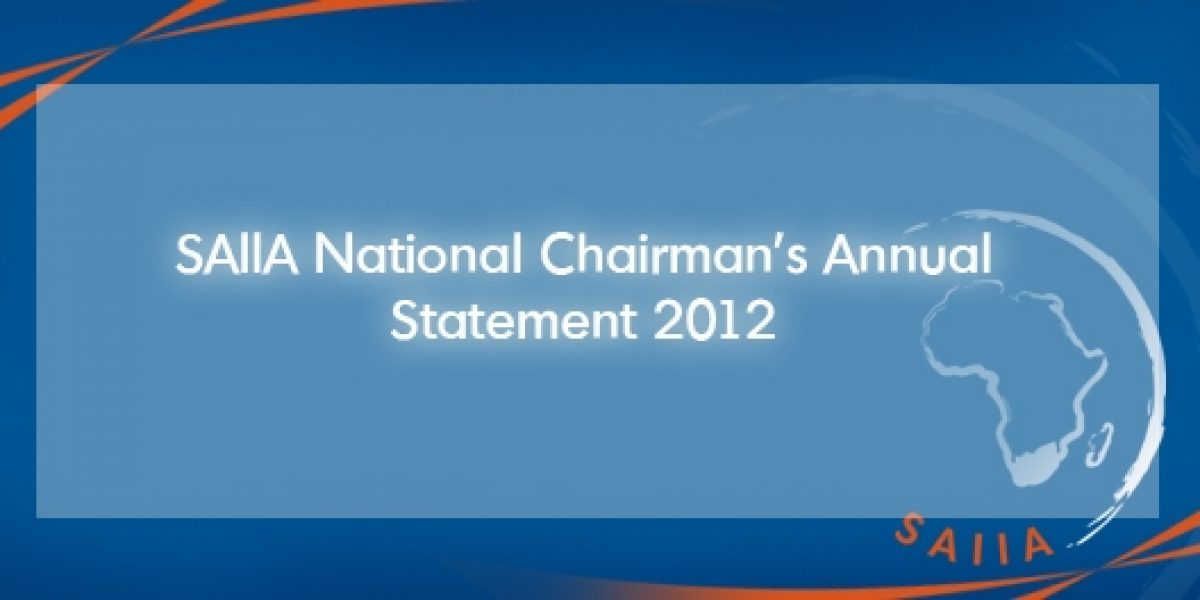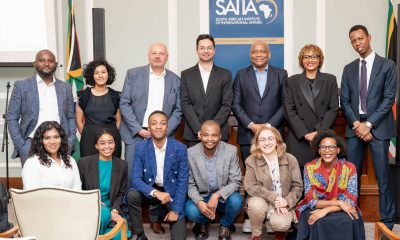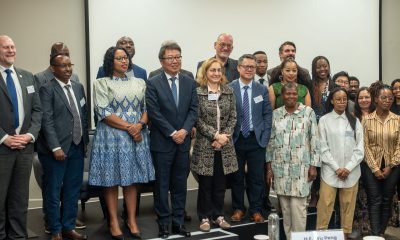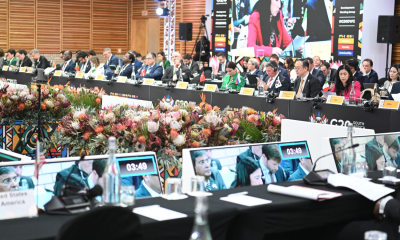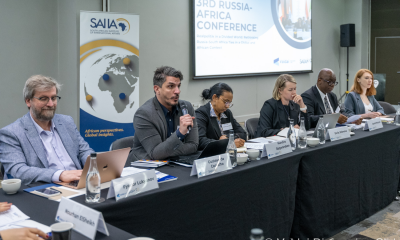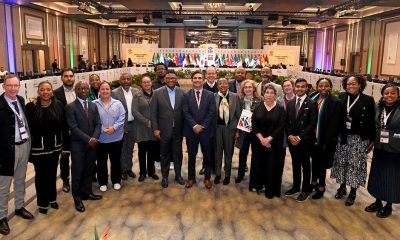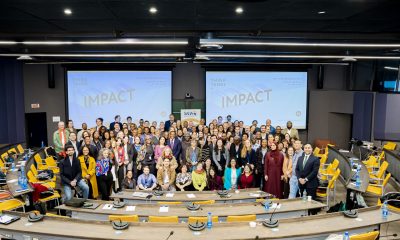As the National Council of the South African Institute of International Affairs meets for its annual meeting (on 27 March 2013), the leaders of the BRICS – Brazil, Russia, India, China and South Africa – meet for the fifth summit of this forum in Durban. Positioning themselves as the rising powers and as a potential counterpoise to the Western-dominated international system, the BRICS as a diplomatic, economic and political idea (not a Goldman Sachs investment construct) have dominated the analysis around the decline of the West in recent years.
The world is clearly not static or one-dimensional in the second decade of the 21st century. Although the United States faces significant budgetary constraints, it still boasts the world’s largest economy and unmatched military power. By the next decade it is likely to become a net energy exporter, with significant implications for energy geopolitics. China is the world’s second largest economy but faces its own internal challenges. Earlier this month incoming premier Li Keqiang highlighted– the need to deal with the rising gap between rich and poor, corruption and worrying environmental damage.
The world is becoming more multipolar, but the contours of a new order and the global norms that should accompany it are still in mutation. In a recent article, Kemal Dervis, vice president of the Brookings Institution and former administrator of the UNDP, emphasised the growing decoupling between global financial markets, which have resulted in the upward rise of the income of the global elite, and ‘inclusive social and economic well-being’, characterised by increasing poverty, unemployment and inequality among the lower income groups. Yet, ‘no alternative growth model has emerged’, he lamented. Neither the BRICS nor the established powers in the North have found answers to the most pressing societal problems that plague the vulnerable in both poor and rich countries. Nor are they always working together to chart new global rules that help to overcome both national and transnational challenges. The world is in a state of flux, still struggling to understand what the new circumstances demand of its various actors. Emerging, but formerly marginalised countries are flexing their own muscles first, thinking of the broader, global good later, in the space created by the shifts in power relations.
Nevertheless, by being a member of a new Southern formation that seeks to influence the shape of the 21st century, South Africa is presented with a unique opportunity. To take full advantage of it, the country must have a clear map of what it seeks to change, based on its underlying principles and its national interest; it must be a global norms entrepreneur and regional policy innovator, which necessitates harnessing skills, brains and ideas both inside and outside government. This is the hallmark of a consolidated and successful democracy – plurality of thought on policy options. Last, but not least, South Africa must be a capable and effective state at home, without which its status as the leading nation in Africa will be severely compromised. In this fast-changing world, South Africa also has to show in deeds (not only in words), that it understands how the country’s national interests can be best advanced in various regional and international forums, not least in the BRICS. In his media statement to journalists before the start of the Summit, President Zuma highlighted that the BRICS Forum fitted well with the objectives of the National Development Plan at the domestic level, while at the global level South Africa aimed for increased support of Bretton Woods reforms, the revival of the Doha Development Agenda, and reform of the United Nations, including the United Nations Security Council.
However, pursuing these through the BRICS has to occur against a backdrop that is fully cognisant of the sometimes divergent interests that the forum’s members have. Furthermore, other trade initiatives, such as the Trans-Pacific Partnership (TPP) and the Trans-Atlantic free trade negotiations, may shift the locus of global rulemaking (if we are not too careful) to these plurilateral or mini-lateral forums, thus undermining the multilateral framework.
We should also not forget other rising middle-income countries such as Turkey and Indonesia, and the possible alliances we need to forge with them in the economic and political terrains. Above all, we need to recognise that our strategic advantage lies in Africa and that we need to allocate more time and resources to our relations with key regional powers such as Nigeria, Kenya, Ethiopia and Egypt, apart from deepening regional integration in our SADC neighbourhood. In this regard, South Africa’s initiative to host a BRICS Leaders-Africa Dialogue Forum is to be supported, but it is not sufficient. After all, much of South Africa’s credibility as a global actor derives from the bold peace-building role that it plays in its region.
For the best part of the previous century Africa was the step-child of the world. Even 13 years ago, The Economist labelled it ‘The Hopeless Continent’. Now phrases like ‘Africa Rising’ and the ‘next frontier’ are used to describe the Africa of the 21st century. These shifts in language reflect a new reality, where a number of countries (notwithstanding their many internal socio-economic or political challenges) are coming into their own. For all our rhetoric, South Africa is not the undisputed ‘gateway’ to the rest of the continent. Regional hubs are emerging. New oil and gas finds on the continent’s east are altering the regional political economy and changing interstate dynamics.
These developments run parallel to renewed convulsions in West Africa, partly precipitated by the fall of Muammar Gaddafi in Libya in 2011, with Mali and Guinea reaping the whirlwind. State fragility and instability continue to characterise politics in the Horn and the Democratic Republic of Congo (DRC). South Africa has staked much on conflict resolution in the DRC and has supported a UN-backed plan for Mali.
However, as President Zuma prepared to host the BRICS Summit, our troops, deployed in Bangui, Central African Republic, tragically have suffered casualties as the city fell into the hands of rebels, or ‘bandits’ as he called them. SAIIA extends its heartfelt condolences to the families of all those affected by the events. The AU has since suspended the CAR and imposed sanctions in line with its 1999 (OAU) resolution outlawing unconstitutional changes of government. Celebrating 50 years since its establishment in 1963, the OAU/AU has come a long way.
For South African foreign policy making the CAR developments raise a number of questions, which we should not be afraid to analyse or honestly critique. Only in this way can we learn from this tragic experience, as well as sharpen our foreign policy focus given the limited resources and the huge challenges we face. What were our specific interests in deploying troops in January – beyond wanting to help bring peace to Africa – given our hesitance (rightly) to deploy troops in Somalia? Did we consult sufficiently internally before the deployment? Did we have an effective military and diplomatic plan? Did we have the requisite resources to undertake such a deployment? Did we use any diplomatic leverage to ensure the Libreville agreements of January 2013 were respected by both sides?
For all the foreign policy praise that South Africa has earned – membership of the BRICS, the G20, chair of the AU Commission, and closer to home, the difficult but determined progress on Zimbabwe as SADC mediator – developments at home in the last year have affected the way in which countries in Africa and beyond view the ‘rainbow nation’. The killing by police of 34 miners at Marikana platinum mine in August, followed by wide-scale unrest in De Doorns among agricultural workers, seared themselves in the national psyche but also caused waves around the world. Ongoing strikes in various sectors and protests against municipalities contribute to a sense of national crisis. This has been exacerbated by commentary from key policy makers on issues ranging from economic to mining policy, policing to land reform that have served to sow confusion rather than support policy clarity and certainty.
After all, a country’s influence, prestige and soft power in the global terrain are shaped as much by how others perceive it as by its internal capacity and self-projection. Perceptions in turn are shaped by actions and reality on the ground, although sometimes they too fall prey to stereotype – and perceptions shape decisions. It is essential to take these seriously and to engage on the substance honestly. The wonder of a democracy, muddled as it is, lies in its frankness, its encouragement of candid dialogue, and its interrogation of situations without fear: we learn from our mistakes and build on successes. These factors permit democracies to rejuvenate themselves. We should have the courage to stand up to our shortcomings in order to emerge better. Denialism is the province of the weak and the refuge of the insecure.
Democracies blossom because of the diversity of ideas and think tanks are an essential component of such societies. In the annual survey of global think tanks of the University of Pennsylvania, South African think tanks are prominently ranked in the sub-Saharan Africa category, where SAIIA was placed first for the fourth consecutive year. Think tanks can play a crucial innovative role in African societies around policy formulation and debate. African governments should embrace them, help them become sustainable, and respect, support and treasure their independence.

